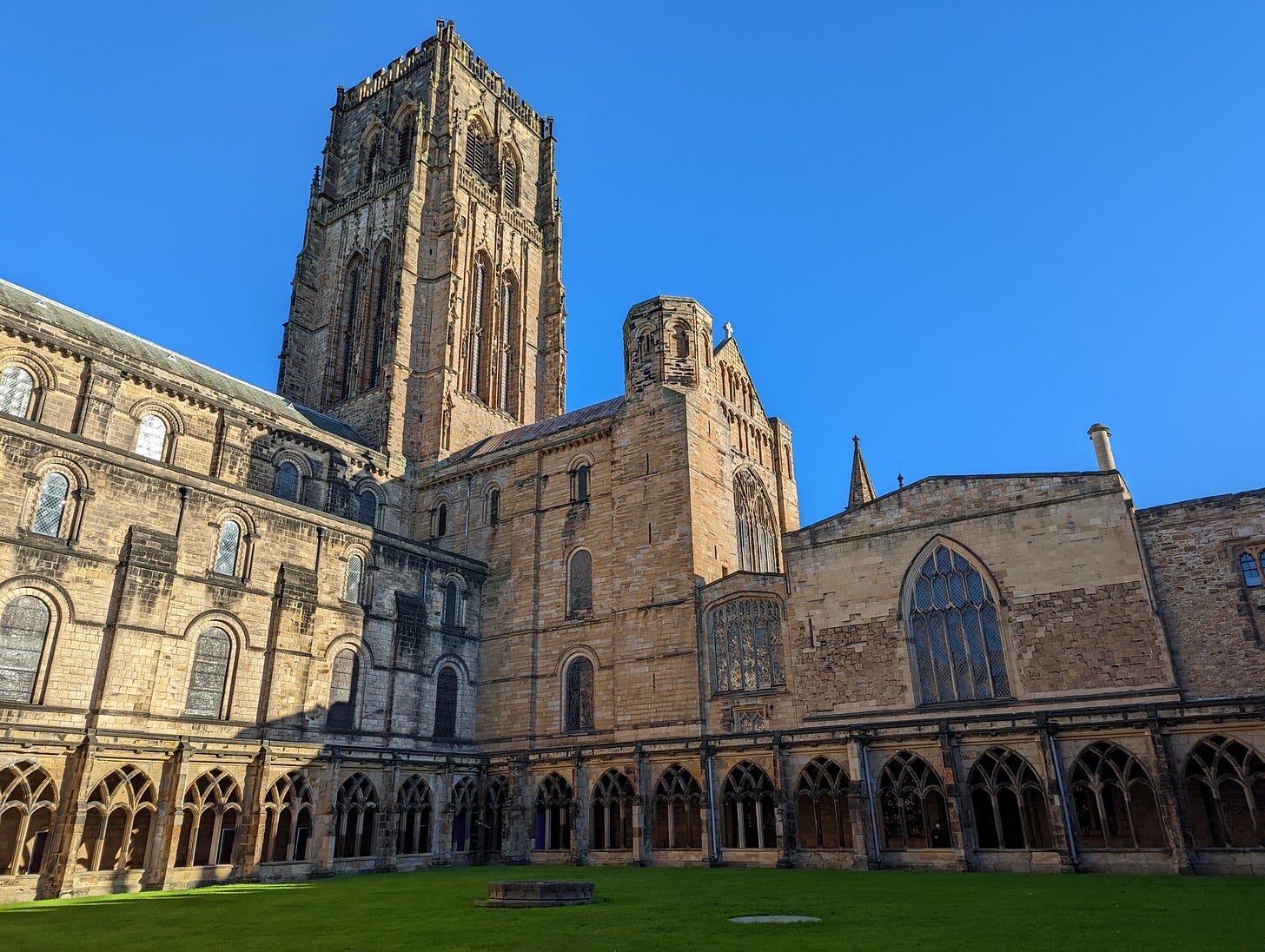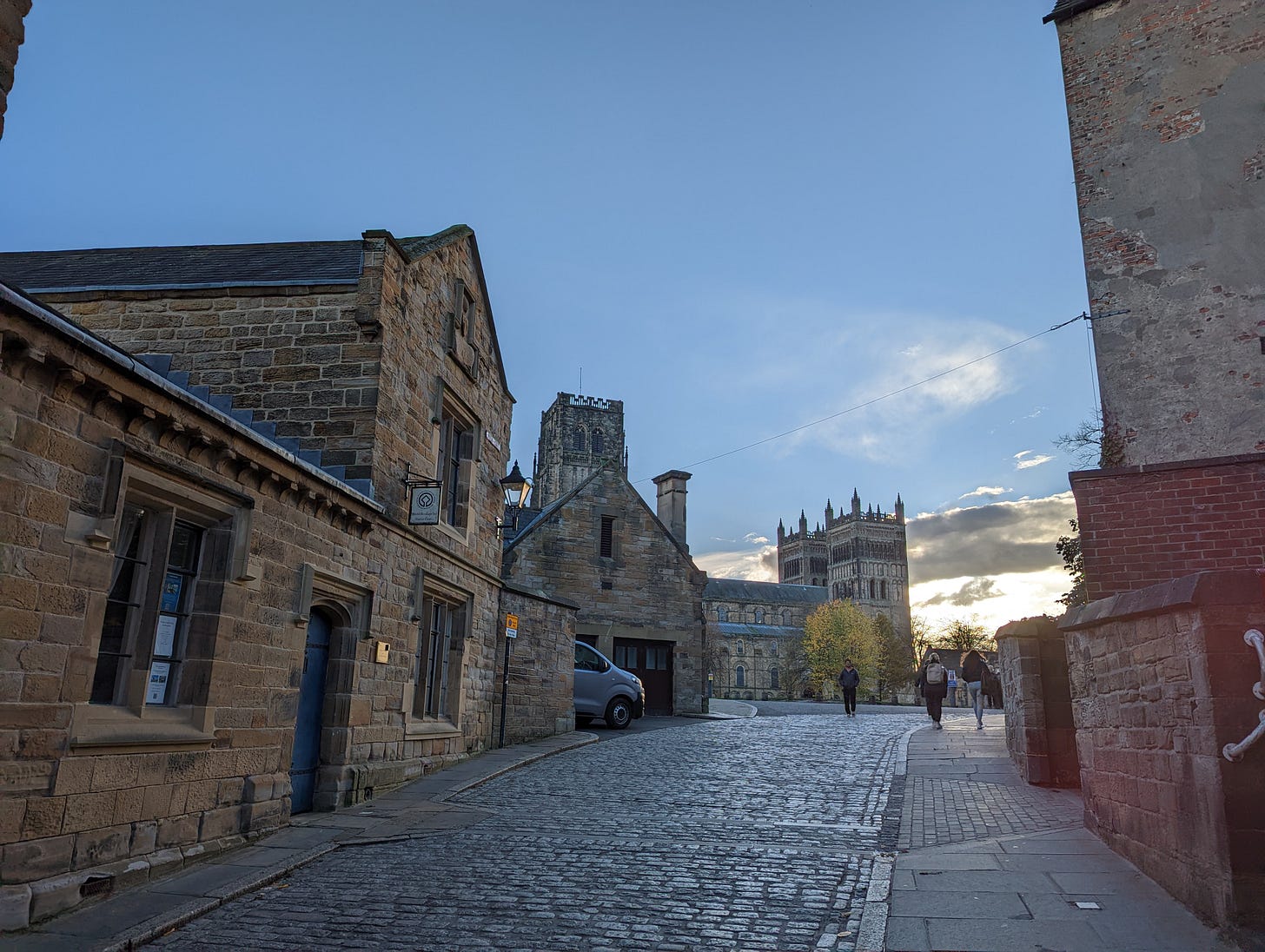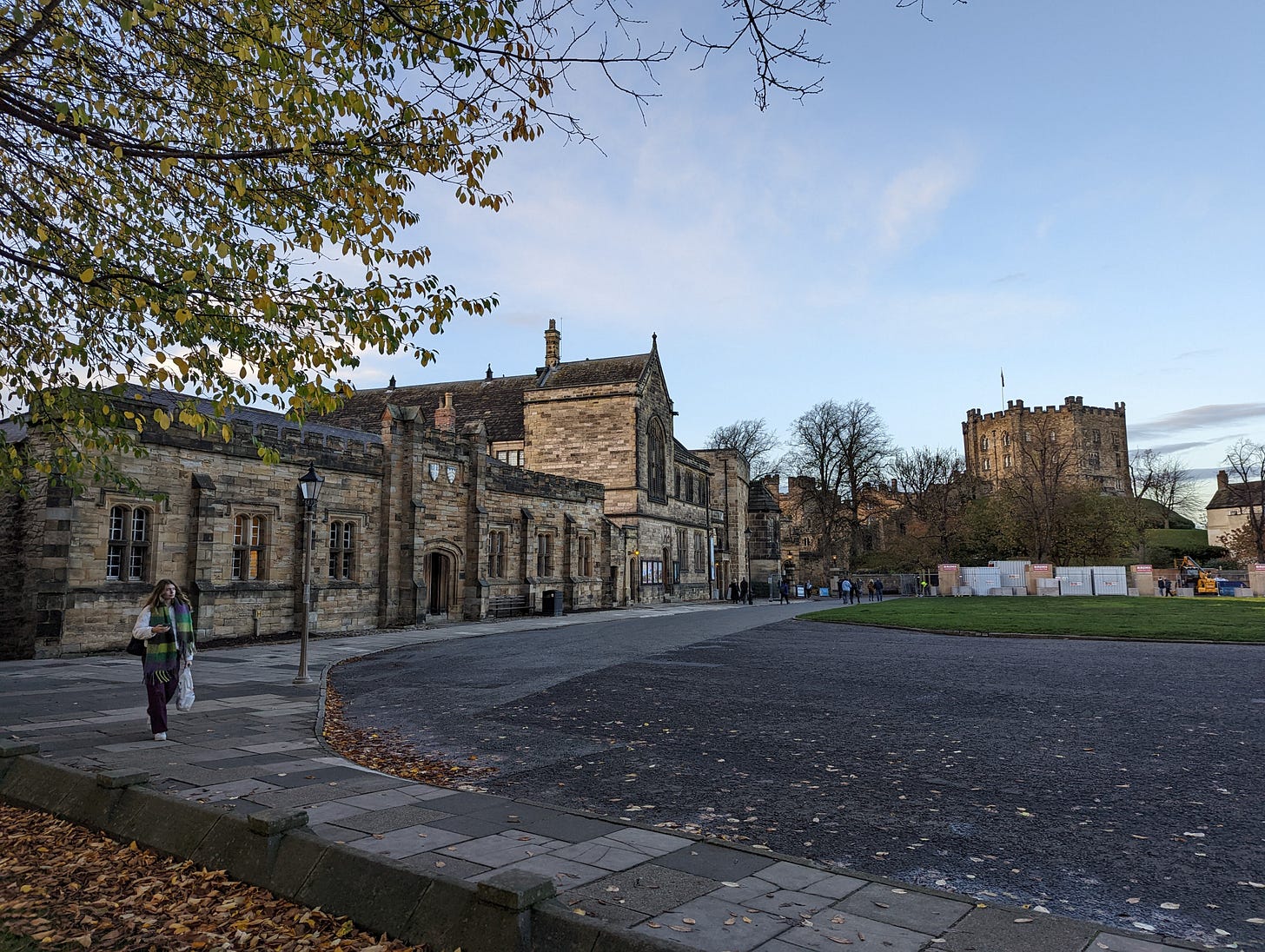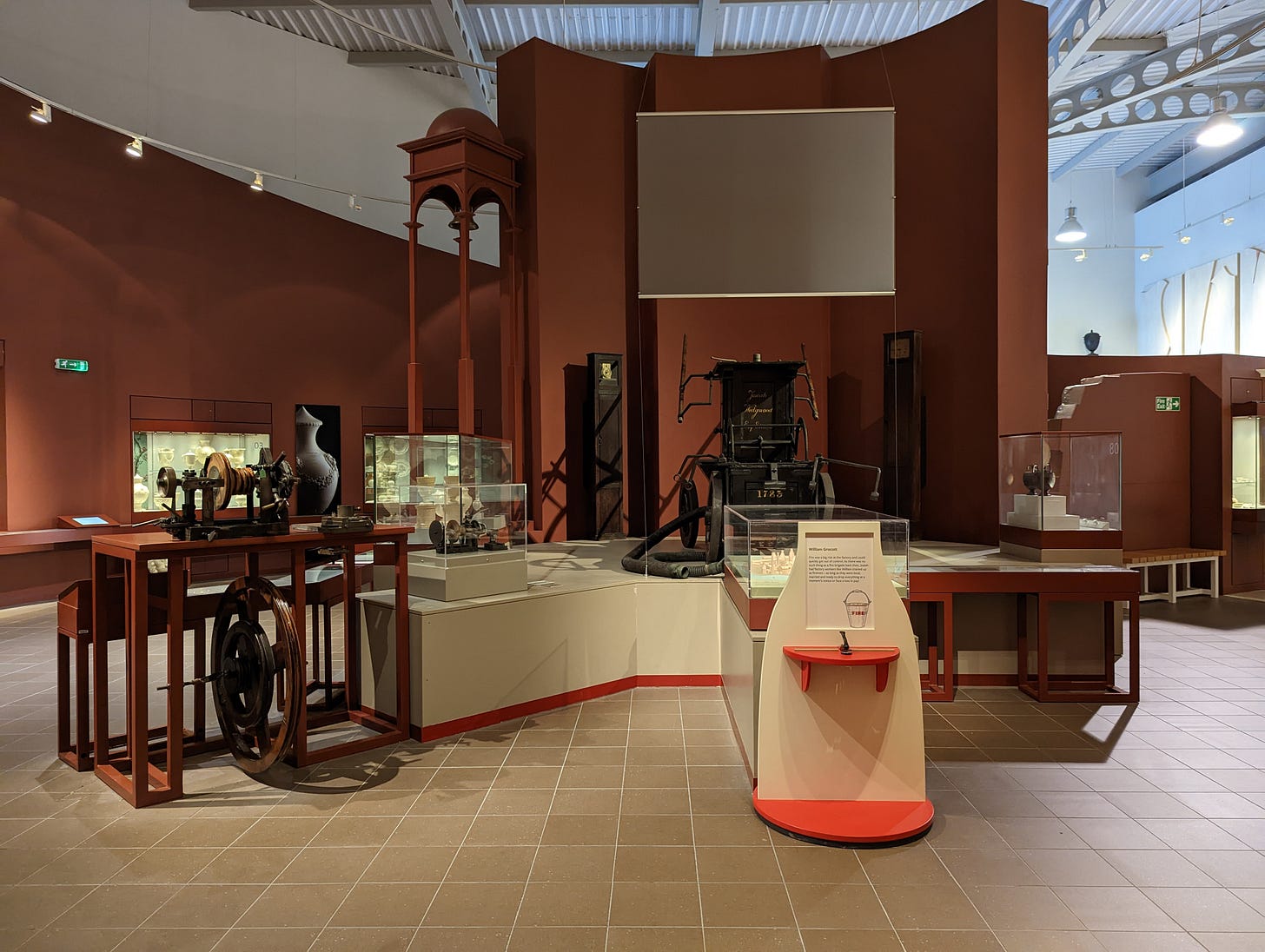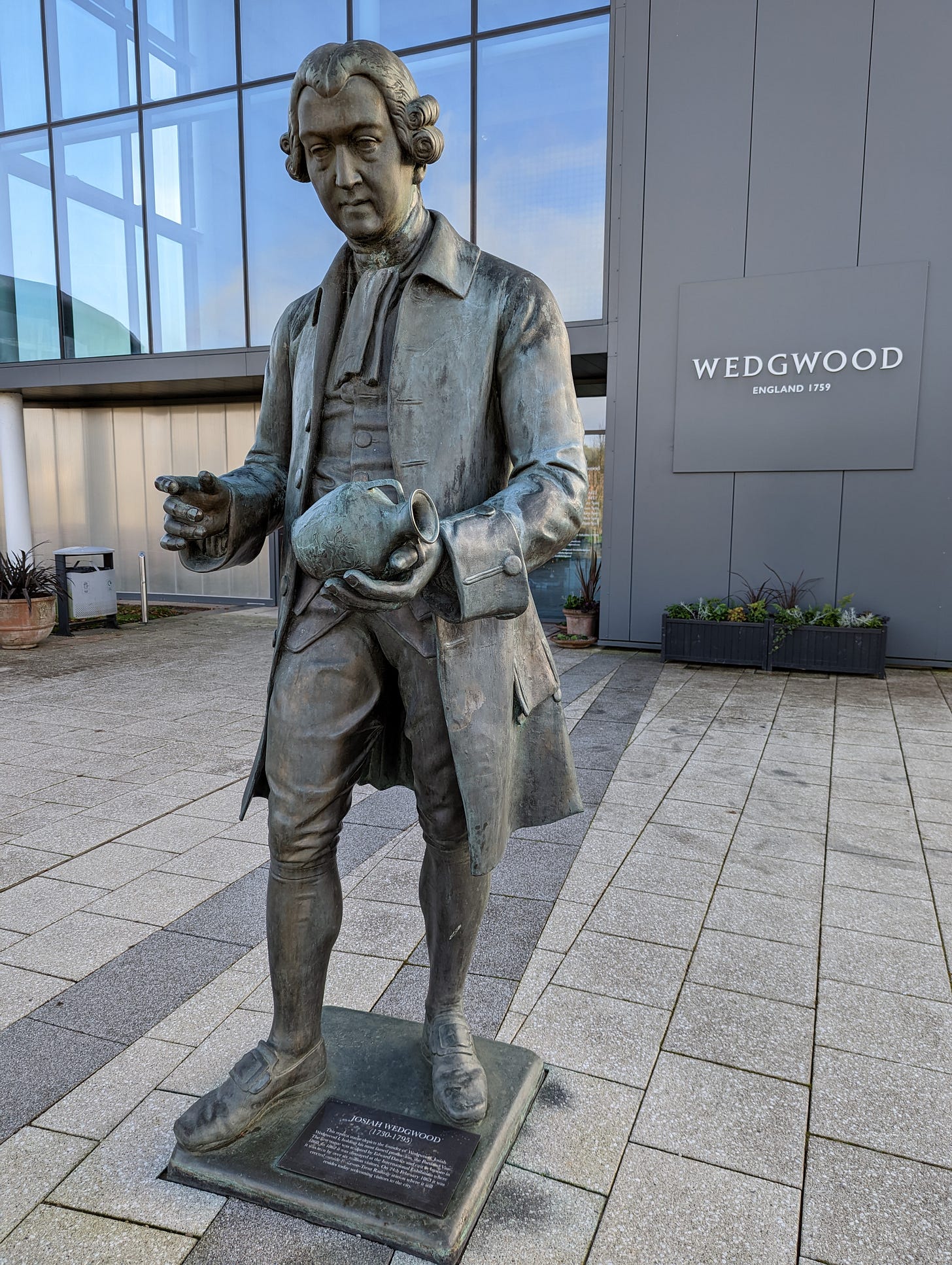№ 4: Lordly Virtues
Magnanimous works and the duality of Christian existence
Dear friends,
Welcome to our fourth Substack! Having just reached the milestone of half a year of marriage we have had cause to reflect upon how packed the last few months have been, and how blessed we feel with each other and with the love and support of so many friends and family. Thank you!
Lordly Virtues
Over the last few months, a recurring theme in our reflections as a couple has been that of the ‘royal’ character of a Christian ethic. Many Christians can regard themselves as underdogs, who must aggressively seek to secure their interests in society against opponents. Such a posture is often coloured by a sort of ressentiment. However, the New Testament teaches that we are children of God, promised a glorious inheritance, forgiven an unpayable debt, and raised up with Christ in his ascension to the Father’s right hand. Among the effects of an existential grasp of these truths should be a kind of magnanimity or greatness of spirit, of the sort that was often presumed to be more exclusive to the rich and powerful by many ancient pagans.
The Christian should be distinguished by lordly virtues such as liberality, courage, self-control, assurance, mercifulness, forgivingness, benevolence, leniency, peacemaking, forbearance, fairmindedness, hospitality, civic-mindedness, lack of resentment, nobility and dignity. Among other things, this broader constellation of lordly virtues—fully exemplified in Christ himself—suits people both to exercise and to attain to a healthy authority and power. The way the Christian faith historically developed and inculcated such a vision of virtue, even among—or perhaps especially among—the poorest and weakest in society, has both contributed immensely to our historic moral values and afforded moral possibilities to us to which we might otherwise have been blind. For instance, turning the other cheek and going the second mile are morally creative responses to dishonouring or oppressive treatment that have informed practices of peaceful resistance.
A couple of weekends ago, I preached on Paul’s vision of good works in Titus 2 and 3, exploring some threads of this vision. Good works for us can often function as acts by which we seek to secure standing with God and our neighbours. In the Sermon on the Mount, Jesus presents an amusing caricature of people blowing trumpets before them as they are about to perform acts of charity, ensuring that they can gain sufficient praise from others. We can do good deeds to get something in return. Alternatively, being good can be imagined as a rather bland niceness or as scrupulous private obedience to moral norms.
It seems to me that the Christian vision is rather more exciting than this.
It finds its source in the remarkable act of divine grace in God’s gift of his Son, to those who were his enemies. This unfathomable gift of immeasurable grace, to recipients unworthy of it and incapable of providing adequate return, provides and exemplifies a new principle by which and reality from which the entirety of life can be lived. Securing our right standing before God himself, it liberates us to engage in a liberal, open-handed manner with our earthly neighbours, as well as friends farther afield - and even with our enemies.
“Love your neighbor as yourself,” Jesus once said, in partial response to a question about how to inherit eternal life. “And who is my neighbor?” asked a lawyer among his interlocutors. He was, we are told, aiming to create a story for himself and others that showed that he at least was doing OK in this regard: he had established a charity to care for the destitute among his fellow Jews, perhaps.
In response, Jesus told the story of the Good Samaritan. A Jew has been robbed and beaten up and left on the side of the road to Jericho. Two other Jews pass him by: they are busy, they are busy, they have good reasons to not stop, as they understand it. Finally a Samaritan - from another demi-Jewish community, distantly related but heretical and firmly outside the “us” camp - stops. The Samaritan brings the half-conscious man back to an inn, washes him, binds up his wounds, and pays the innkeeper enough to cover his keep, with the promise of more as necessary. “Who was that man’s neighbor?” asks Jesus. “The one who helped him,” responds the lawyer. “Go and do likewise,” says Jesus: model yourself on that Samaritan.
What was it that the Samaritan did? He saw a man, and loved him, and responded to his need. He did so generously, calmly, without anxiety or penny-pinching; he did not try to figure out what the least he could do was, or why it might not be the case that he owed this Jew mercy: this man who certainly might have been someone who looked down on him as an ethnic and religious other, a stepbrother at best. He acted like someone who was not anxious, and that enabled him to act out of love and with liberality.
Since God has graciously established us in good standing with him, secured our destiny, and taken up our cause, we no longer need to engage in the same sort of competitive struggle for standing and aggressive insistence upon our dues that might otherwise preoccupy us. Being forgiven, we can forgive. Having been freed, we can free others. We can show kindness to enemies. We can respond to cruel treatment with love. We can live without feeding grudges, ressentiment, and bitterness.
This is not an entitlement to neglect those closest to us, to stifle natural familial affection. We can and must love and honor our parents, our spouses and children and families in particular - but we should not feel the need to curtail our natural affections or the expansiveness of our friendship, or pinch the pennies of our sympathy. We are limited beings; we see people in the I-thou of friendship one at a time. One cannot and does not love mankind in general. But at the same time, we need not limit those I-thous, those exchanges of friendship and kindness, to just those who have been vetted by some rigorous process of worthiness or of likeness.
It might also help to consider Paul’s understanding of good works against the backdrop of ancient euergetism, in which wealthy or elite individuals demonstrated their civic-mindedness and won honour by performing acts of generosity to poorer persons in the society, throwing banquets, providing entertainment, or sponsoring the construction of civic buildings or amenities. Comparable good works in the contemporary world might involve a multimillionaire investing a large sum of money to make a great park for his childhood town, creating a scholarship for deprived students at a university, or donating some of their private art collection to a public museum.
While the ‘good works’ of ancient society were chiefly the civic acts of the rich and powerful, in Titus and elsewhere Paul teaches that the gospel creates a whole community of people who are zealous for ‘good works’, who eagerly want to find some fitting outlet in which they can show goodness, grace, material benefit, and open-handed forgiveness to others as God has shown that to them. The point of such ‘good works’ is not merely to be obedient to commands narrowly considered, but to be free and fruitful participants in a new society defined by giving to others without demand of return. This vision is inherently outgoing and creative, giving to those from whom we have received nothing, making neighbours of strangers, and seeking any openings to give of ourselves, even to those who could make no claim upon our concern. One of the consequences of such good works is that they naturally produce a strong and loving community.
In Acts 9, a person full of good works and acts of charity is described to us: not a rich merchant or ruler, but a woman named Dorcas who had devoted her available time to making clothes for widows. She was so overwhelmed with the grace and goodness of God to her that she wanted to find some suitable way to show goodness to others. Elsewhere, we are told that, wherever the gospel would be proclaimed, the generous act of the woman of Bethany who poured out the expensive ointment on Christ would be recalled. There is a sense of ease and overflowing here, of helpful and beautiful work which comes out of energetic rest, of leisure in the ancient sense: fruitful work of the hands, rather than frantic busy-ness.
A church formed by God’s grace and goodness is a people defined by ‘good works’, by a free and liberal giving to and forgiving of others, by dramatic acts of loving devotion for Christ and neighbour. And the result of all of this is a form of society in which the contrast with a society formed by sin couldn’t be sharper. A society where everyone is in it for themselves, envious, rivalrous, vicious, and antagonistic towards others, in a zero-sum battle with even their own children or parents, brothers or sisters, is changed for a society of people who forgive others as God has forgiven them, who visit the needy in their plight as God visited us as needy sinners in our plight, who freely give as we have freely received. Good works in such a society are not mere necessary responses to unwelcome duties, but free acts of love that honor old bonds and form new ones, which rebuild community where it has crumbled and create community where none previously existed. This all results from God’s free gift to us.
The outflowing of our gifts from God’s gift is perhaps most powerfully seen in the way that the one Gift of the Holy Spirit, given to the Church at Pentecost, is manifested in innumerable and diverse spiritual gifts by different members of the body. Perhaps counterintuitively, our participation in God’s Gift is manifested through our exercise of spiritual gifts - teaching, helping, organizing, encouraging - as spiritual and corporal works of mercy and loyalty for others. God does not merely make us recipients of his gift—to receive his Gift is to become a participant in his giving, to bear fruit in loving and outgoing service of others.
Recent Work
Susannah: We’ve wrapped up the Vows series of our podcast; see here for the final episode, where I spoke with rabbi and philosopher-at-large Zohar Atkins about the role of vows in the Hebrew Bible and in the philosophical tradition. The next podcast series is in the works, linked to our Generations issue.
❧ Speaking of which, that is going to press today: I can’t link to it because it’s not up on the website yet but go here and in a couple of days you’ll start to see the first articles from that new issue. I am EXTREMELY excited about it. Unreasonably so, really.
❧ Last night, at midnight our time - a more reasonable 7 pm EST - I had the opportunity to get grilled, along with my colleagues Peter Mommsen and Trevor Wiser, by a batch of student journalists who are members of the Veritas Forum’s Augustine Collective. We talked about everything from journalism as conversation to cultivation of community through publishing, from style to content, from the grind of proofreading the final pdfs before an issue goes to press to the joy of hearing from readers. To learn more about the Augustine Collective’s work, go here.
❧ Recently, I had the opportunity to go on Michael Horton’s White Horse Inn podcast to talk about political philosophy: is American-style Lockean liberalism, emphasizing individual property rights and conceiving of ourselves primarily as isolated choosers, the best way to understand our political entanglements, projects and loyalties, and our duties to each other? In a development which will shock no one, I said Nope.
Alastair: In the latest issue of First Things, I have a review of Paul Copan’s new book, Is God a Vindictive Bully? Reconciling Portrayals of God in the Old and New Testaments.
❧ Wyatt Graham invited me on his podcast for a discussion of biblical interpretation and James Jordan. Which provides a good appetiser for…
❧ The Theopolis podcast has recently started working through James Jordan’s seminal book on biblical typology and symbolism, Through New Eyes. We have episodes on the introduction and first chapter and on chapter 2.
❧ In Mere Fidelity’s latest two episodes we discuss two recent books with their authors, The Thrill of Orthodoxy with Trevin Wax and Uncommon Unity with Richard Lints.
❧ I joined Bryan Zhang on his podcast for a lengthy conversation on recent gender debates.
❧ While recording various podcasts, playing boardgames with our godson, and watching the opening episodes of the new season of The Crown, I have largely completed my knitting project: a baby blanket.
Both: When we were in Durham (see below, in Happenings and Doings) what our godson said he really wanted to do was to bake a cake that looked like the moon. See below for our moon cake (chocolate, with buttercream frosting and massive amounts of sparkles) and its accompanying TARDIS (gingerbread with fondant, plus royal icing decorations.) We consider this a triumph, but also something to be surpassed.
What We’re Reading
Alastair: American Christian nationalism has been a subject I’ve been reading around for a couple of months now. Over the last week, I’ve been thoroughly enjoying Sam Haselby’s scintillatingly historical work, The Origins of American Religious Nationalism. It has some fascinating insights, which are deeply relevant in current debates. I recommend it very highly. I’ve also revisited Samuel Goldman’s After Nationalism: Being American in an Age of Division, a brief work that helpfully outlines some of the limitations of a nationalist vision in the American context and the historical evolution and failure of various such visions.
Over the last couple of days, I have started working through Stephen Wolfe’s The Case for Christian Nationalism. I will likely be writing something more substantial on these issues soon. For now, I thought I’d share a few thoughts on one aspect of the New Testament’s teaching that has bearing on these questions.
Within our previous newsletter, I noted the way that the Church has historically played a critical role in the creation of ‘place’ in England:
In England, our fundamental reality of ‘place’ is something that has been powerfully formed by the Christian church. Throughout the country, church towers and steeples serve as landmarks. The graveyards surrounding many church buildings manifest the deep intergenerational rootedness of Christian communities in specific places. Minster communities served as model communities and seeds of wider habitations. Historic routes of pilgrimage are found in various parts of the land. The entirety of England is divided into bounded parishes and dioceses.
As I argued there, I believe that the Christian faith encourages deeper, fuller, and richer experiences, expressions, and articulations of place and locality. However, even while valorizing the parochial, the Church by its very nature resists and counteracts the pull of parochialism.
A faithful Church will also temper and relativize people’s loyalties to their national and ethnic groups.
It is worth considering the example of the Apostle Paul here. The Apostle Paul was, as many have noted, a man who inhabited several different worlds. He was a Jew born in the commercial city of Tarsus in the Roman province of Cilicia. Although a Roman citizen by birth, he grew up in Jerusalem, where he was taught at the school of Gamaliel. He had a Latin (Paul) and a Hebrew (Saul) name. He spoke Koine Greek, Aramaic, likely Latin, and could read Hebrew. Besides knowing the Scriptures, he had knowledge of Stoic and other pagan literature. Even before his conversion he seems to have been well-travelled and something of a cosmopolitan.
After his conversion, he came to regard the immense ‘gain’ of his identity as a ‘Hebrew of the Hebrews’ as ‘loss’ and as ‘rubbish for the sake of Christ (Philippians 3:2-11). Even though he continued to see himself as a Jew and feel a profound kinship with and concern for his fellow Jews, that identity was utterly surpassed by what it meant for him to be in Christ. And this fact caused the Apostle to sit much more loosely to his Jewish identity. He willingly fraternized with Gentiles. He became all things to all men, living like a Gentile to win Gentiles and like a Jew to win Jews (1 Corinthians 9:20-22).
This wasn’t just a private thing, but was integral to Paul’s mission. Paul’s mission was not merely to form a Gentile church alongside a Jewish one, but to form one Church within which Jews and Gentiles were a single people in Christ. Jews and Gentiles being ‘one people in Christ’ wasn’t merely a spiritual reality in Paul’s thinking, but something that needed to be expressed through the establishment of material communications and communion between Jews and Gentiles both locally and across the entire body. The fundamental spiritual truth of the Church’s invisible reality naturally produced an impulse towards faithful material expression in the living sign of a visible body—and visible bodies.
A project near the heart of Paul’s missionary endeavours was that of collecting gifts from Gentile churches across the empire for poor Christians in Judaea: such gifts were a concrete expression of the Church’s unity, a natural consequence of spiritual fellowship. So much of the book of Acts describes the creation of a network of communications between churches, linking Jewish and Gentile-dominated congregations with exchanges of letters, ministers, gifts, etc. Such material exchange helped to strengthen the sense of being one new body.
This wasn’t merely an exchange between churches, though. In places like Antioch, Paul resisted the separation of Jews and Gentiles and insisted that refusal to eat together as one people was a denial of the gospel, as he argues in Galatians. The grounds of Paul’s objection to such separation weren’t drawn from timeless principles of nature or some proto-liberalism, but from the irruptive work of Christ in history.
The divides between Jews and Gentiles were covenantal, but were also very much about peoplehood and ‘ethnicity’. Jews limited their dealings with Gentiles and that was important to their sense of distinct peoplehood. Paul’s mission cut directly against this. A Jewish Christian in Antioch who regularly ate with and fraternized with Gentiles would easily come to be regarded as compromising Jewish identity, and might be ostracized herself. Even though it didn’t abolish it, the spiritual union of the Church, concretely expressed in such communion, unsettled ethnicity. The Church was a new reality in history, a body of people that was a living sign of the unity of gospel. It didn’t replace the nations, nor did it evacuate natural peoplehood of force, but by its very presence it relativized them.
Naming the name of Christ in the first and second century world would have had immediate and significant ramifications for many people’s participation in civic life, for their ethnic belonging, for their families’ support. For many of the earliest converts—like many converts still today—conversion would almost unavoidably have entailed a breach with their compatriots and kinsfolk, as Christians were often ostracized, persecuted, disowned, and scattered. The earliest Christians were routinely suspected of disloyalty to their nations and peoples. Jewish converts were accused of threatening the symbol of the temple, a core symbol of Israel’s sacred peoplehood, and of compromising the boundaries that set Jews apart from the nations. Gentile converts were accused of supporting a rival king to Caesar.
Paul’s son in the gospel, Timothy, was a young man with a Jewish mother and a Gentile father. One can imagine that the early church greatly encouraged such intermarriage within the cosmopolitan cities of the empire in which it flourished. Belonging to the Church, as a concrete community that involved mutual support, shared meals, fellowship, and mutual honour, among people whose ethnic belonging had been thrown into question by their conversion, would have unsettled ethnic divides between its members both within particular cities and across the empire more broadly.
The Church can help to create deep localized peoplehood, its catholicity bringing together people of different classes, ethnicities, temperaments, and backgrounds within a given place. However, it also forms unity on many different levels, each level tempering others. The Church, for instance, can form unity both across and within a nation, both nationally and intra-nationally. However, it also encourages international, transnational, and supranational forms of unity that challenge any narrow parochialism or nationalism. Christians formed by such a Church can be truly rooted in their places, while never being submerged in them, always recognizing that the body of people to whom they most deeply belong exceeds their immediate places and their primary loyalty is not to their nation or ethnicity.
There is something of a cosmopolitanizing impulse to the Church, well exemplified in its initial mission, which was chiefly characterized by cosmopolitan missionaries and diasporic dynamics. People like Aquila, with Jewish diaspora backgrounds, who lived in several regions. While putting down Christian roots in particular places, the mission of Paul and others also had the effect of dislodging converts from their submersion in their immediate places and peoples, making them a part of a concretely manifested and practiced solidarity across many such places and peoples.
As Christians, it can be good to pursue solidarity at intranational and national levels in our temporal polities. When such solidarity is practiced in explicit submission to Christ as Lord, even better! However, a healthy Church will directly impact and temper all such projects. Christians may remain in their natural societies, but also acknowledge themselves to be strangers and exiles upon the earth. Their relationship to those societies is transformed by the fact that they always have one foot outside of them. Being fellow citizens with the saints, members of a new household, their conduct within natural polities is transformed. Their loyalties are henceforth divided; they are much less invested in their natural identities and belonging, even to the point of considering them ‘rubbish’ relative to what they have gained in Christ!
There is a danger inherent in some Christian thinkers, for whom a ‘two kingdoms’ approach takes the form of something closer to demarcated spheres, rather than two distinct facets of the same reality, both simultaneously impinging upon us. Such an approach cannot provide a good account of the immense sociological impact—and demands—of the truth of the gospel upon the Church and, through the Church, upon wider societies and polities. Supposed two kingdom thinking can be a way of keeping transformative gospel principles from infecting an imagined ‘natural’ politics. Here it might be helpful to recall the rhetorical approach of someone like Luther, who, like the Apostle Paul and other New Testament witnesses, loved to present ‘two kingdoms’ truths in ways that accentuate the reality that, practically speaking, Christian life involves constant negotiation of a dynamic duality, admitting no simplistic compartmentalization:
A Christian man is the most free lord of all, subject to none. A Christian man is most dutiful servant of all, and subject to everyone.
The same duality of Christian existence is expressed in the second century Christian letter to Diognetus by Mathetes.
For the Christians are distinguished from other men neither by country, nor language, nor the customs which they observe. For they neither inhabit cities of their own, nor employ a peculiar form of speech, nor lead a life which is marked out by any singularity. The course of conduct which they follow has not been devised by any speculation or deliberation of inquisitive men; nor do they, like some, proclaim themselves the advocates of any merely human doctrines. But, inhabiting Greek as well as barbarian cities, according as the lot of each of them has determined, and following the customs of the natives in respect to clothing, food, and the rest of their ordinary conduct, they display to us their wonderful and confessedly striking method of life. They dwell in their own countries, but simply as sojourners. As citizens, they share in all things with others, and yet endure all things as if foreigners. Every foreign land is to them as their native country, and every land of their birth as a land of strangers. They marry, as do all [others]; they beget children; but they do not destroy their offspring. They have a common table, but not a common bed. They are in the flesh, but they do not live after the flesh. They pass their days on earth, but they are citizens of heaven. They obey the prescribed laws, and at the same time surpass the laws by their lives. They love all men, and are persecuted by all. They are unknown and condemned; they are put to death, and restored to life. They are poor, yet make many rich; they are in lack of all things, and yet abound in all; they are dishonoured, and yet in their very dishonour are glorified. They are evil spoken of, and yet are justified; they are reviled, and bless; they are insulted, and repay the insult with honour; they do good, yet are punished as evil-doers. When punished, they rejoice as if quickened into life; they are assailed by the Jews as foreigners, and are persecuted by the Greeks; yet those who hate them are unable to assign any reason for their hatred.
Susannah: Because I had a miniature biography of St. Augustine’s mother Monica to write for the Generations issue of the magazine, I ended up reading a good bit of the Confessions (the Chadwick translation, not the Ruden one.) I’ve come around from my previous anti-Monica stance: yes, she pressured her son into giving up his lower-class commonlaw wife, but she was a good grandmother to their son; one has an absolutely overwhelming sense of her as a kind of late classical North African Upper East Side lady; her aspirations for her gifted son, and her frustration with both his louche bohemianism and his terrible theology are, I have to say, relatable. Becoming a celibate bishop was not the kind of normal patrician life she had in mind for him, but she took the win. They are not perfect, that family, but they are so human, and I love them.
I’m also reading Stephen Wolfe’s book, about which I will also be writing more.
And I’m on to the fourth in Ben Aaronovich’s Rivers of London series: funny London-cop police procedurals but (you saw this coming didn’t you) WITH MAGIC. What if London’s genii locorum were all real and also sometimes you had to do business with them to solve crimes?
Happenings and Doings
A week ago, we spent a few glorious days in Durham, with our godson and his dog. Durham is one of the most beautiful cities in England and having lived there for several years, Alastair always loves the opportunity to revisit, and Susannah has fallen in love with its medieval steampunk atmosphere.
After our time in Durham, we spent a couple of days in London.
Back in Stoke, a few days ago we took some time to visit the World of Wedgwood, an hour’s walk up the canal from our house.
One of several things I love about Stoke-on-Trent is its history of intense innovation and industry in creating remarkably beautiful objects, and its aspiration to make the ownership of such objects affordable to the masses. People from Stoke take pride in the fact that, throughout the world, our home city is synonymous with our creations. Indeed, we take our demonym from this: Potters. We will often surreptitiously peek beneath china when at a meal to confirm that it was indeed fashioned in Stoke.
I'm far from unbiased on the matter, but pottery has always seemed to me to be a peculiarly elevating product. Pottery is designed for use, but also for beauty. The fine pottery Stoke makes represents a democratized aspirational vision of owning beauty and of refined practice. The products of Stoke's industry have been proudly displayed on shelves and in cabinets in countless houses around the world. Taken out and used on special occasions, their affordable artistry has evoked and adorned the natural dignity of many a family's gathering.
Eating off Wedgwood plates, or having afternoon tea with Wedgwood fine china, is an invitation to participate in an elevating ritual. It evokes a particular comportment. You take your time, pay attention, savour things, watch your manners, and practice etiquette. And such fine china can become the symbolic bearer of something of the ethos of a family, which can pass between generations. You might inherit your grandmother's china and, every time you use it, something of your grandmother's values will inform your manners at table.
Besides the dignity such products give to owners, they also represent a profound source of pride for their makers. Stoke calls itself ‘The Potteries’ and Stoke people call themselves ‘Potters’ because our city has used all its ingenuity and craft to give this gift to the world. I amuse Susannah with how much I go on about this sort of thing, but such painstaking commitment to beauty and excellence in design for the masses represents an inspiring alternative to the culture of products that is more typically experienced within a 'consumerist' society.
Josiah Wedgwood was a relentlessly creative and driven man, who fashioned the finest pottery from Stoke's very earth, and pioneered the canal system that the city still enjoys.
Upcoming Events
❧ Alastair’s next Davenant Hall course will be an exploration of the attentive reading of biblical narrative, through the lens of the Exodus: ‘Students will study the literary means by which texts evoke deeper narrative patterns and the ways in which echoes of past events and themes, or anticipations of future ones, are used to communicate authorial vantage points, theological import, and ethical direction to readers.’
❧ This weekend we have another get together with theologically-minded friends in the West Midlands in Shrewsbury. Get in touch if you’d like to join.
❧ And we’ve booked our tickets back to New York! Susannah will be heading back in late November, in time to make the annual friend-group showing of Whit Stillman’s Metropolitan, which we traditionally observe on the first Sunday of Advent; Alastair will be heading over around two weeks later. US friends: we look forward to seeing you!
Much love,
Alastair and Susannah






